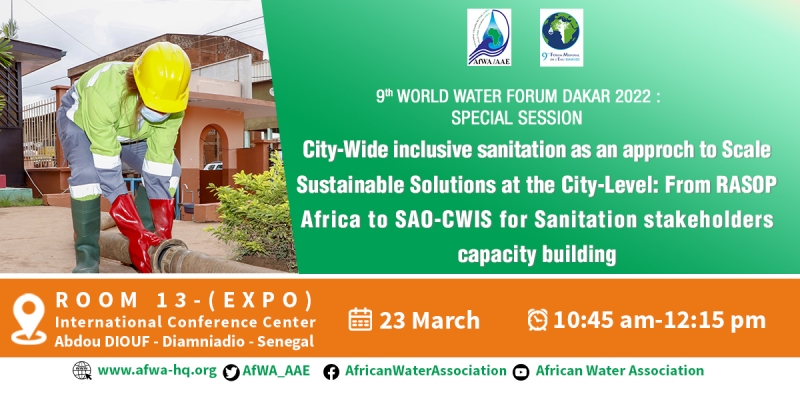Background
Access to safely managed sanitation services is one of the crucial challenges for most African countries. The quality and coverage of services by sanitation operators are inadequate due to many factors, including institutional fragmentation, lack of leadership, weak regulatory frameworks, poor skills in management, operation and maintenance of sanitation systems, and lack of sustainable financing models for on-going service provision. This situation is worsened by a fast population growth and sprawling and uncontrolled urbanization. In 2006, the United Nations Secretary-General’s Advisory Board on water and sanitation recognized the WOP (Water Operators' Partnerships) approach - which fosters capacity building and knowledge sharing through partnerships of water and sanitation operators - as an effective means of overcoming identified challenges and thus of improving the performance of the operators and fast-track progress in achieving the MDGs for water and sanitation services.
With the funding and technical support from the Bill & Melinda Gates Foundation during the period 2016-2018, AfWA launched a round of sanitation operators partnerships (SOP) within the “Reinforcing Capacity of African Sanitation Operators on non-sewer and fecal sludge management through peer-to-peer learning partnership” (RASOP-Africa) with the aim at improving the quality of urban fecal sludge management and non-sewer sanitation services and coverage for at least one million people in the Sub-Saharan Africa region through improving strategic sanitation planning, development of sustainable projects, and institutionalization of sustainable operational and financing framework for sanitation in utilities and/or municipalities.
Building on this SOPs experience that created a big momentum for sanitation partnerships in Africa, a new project named "Strengthening AfWA and operators’ capacity for the implementation of city-wide inclusive sanitation in Africa (SAO-CWIS)" has been initiated with the aim to expand the approach to other African cities and AfWA members in order to contribute to the SDGs and the overall urban sanitation agenda in Sub-Saharan Africa following the City-Wide Inclusive Sanitation approach.
Citywide Inclusive Sanitation (CWIS)[1] is a public service approach to planning and implementing urban sanitation systems to achieve outcomes summarized by Sustainable Development Goal 6: safe, equitable, and sustainable sanitation for everyone in an urban area, paying special attention to the needs of the poor, the marginalized, and women and girls. To advance and sustain SDG outcomes at a meaningful scale, all CWIS systems must demonstrate three core functions:
-
A responsible authority(ies) is executing a public mandate for inclusive urban service delivery.
-
The authority(ies) is accountable for performance against its mandate.
-
Resource management and planning reflect authority mandates, priorities, and performance accountability.
The World Water Forum in Dakar is an ideal platform to discuss this approach, which can contribute to accelerating the achievement of the SDGs through better delivery of sanitation services in Africa. Thus, participants from all levels and from all fields, including politics, multilateral institutions, academia, civil society and the private sector, among others, will exchange around the challenges facing the sanitation sector and about innovations to be put in place to reverse the trend of an ever-increasing deficit of suitable sanitation services.
Session Objectives
-
Discuss the local and global urban sanitation issues
-
Identify key challenges that contribute to poor sanitation in cities
-
Describe approaches: WOP, CWIS approach and Service Framework, principles and key stages for CWIS action
-
Agree on the role of the private sector and regulators on CWIS implementation
-
Explain AfWA contribution in building the capacity of African Utilities and municipalities to improve sanitation service delivery.

 English
English  Français
Français 
